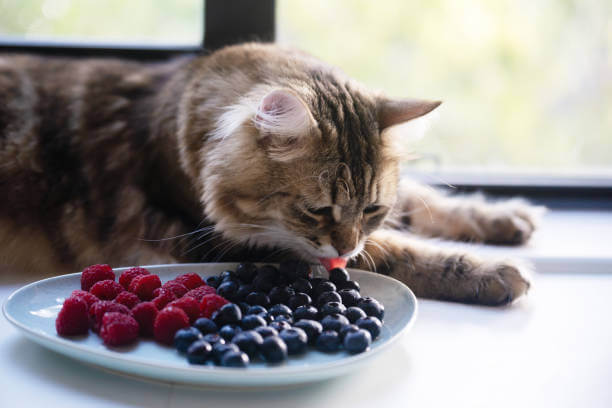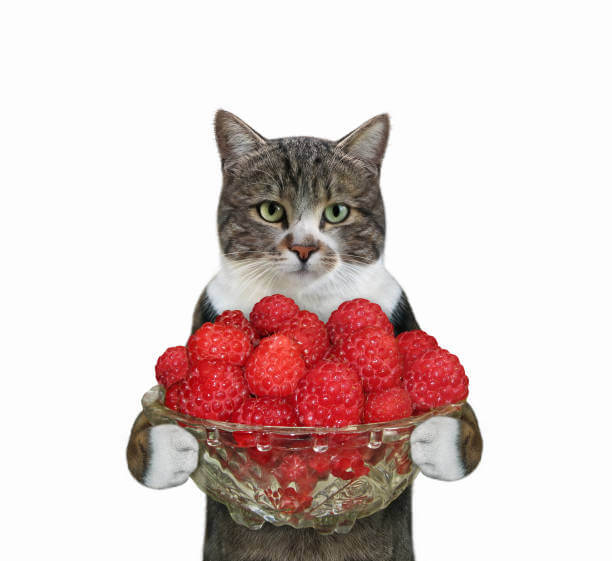Don’t let your cat experience any harm from eating the wrong thing. Find out if Can Cats Eat Raspberries with this helpful guide! Cats are curious creatures, known for their discerning tastes and unique dietary needs. As a cat owner, you may find yourself wondering whether it’s safe to share some of your favorite fruits with your feline companion. One such fruit that often raises questions is raspberries. These vibrant and juicy berries can be a delightful summer treat for humans, but what about cats? In this comprehensive guide, we will explore the topic of cats and raspberries, addressing their safety, potential benefits, and any precautions you should take.
The Safety Factor

When it comes to introducing new foods into your cat’s diet, safety is always the top priority. While raspberries are generally safe for cats to consume in moderation, there are a few considerations to keep in mind.
Digestive Sensitivity
Cats have sensitive digestive systems that are adapted to a primarily meat-based diet. Introducing new foods like raspberries can potentially upset their stomachs or cause gastrointestinal issues such as diarrhea or vomiting. Therefore, it’s crucial to introduce new foods gradually and observe how your cat reacts.
Allergic Reactions
Although rare, some cats may have allergic reactions to certain fruits like raspberries. Signs of an allergic reaction may include itching, swelling, difficulty breathing, or gastrointestinal distress. If you notice any of these symptoms after feeding your cat raspberries or any other food for that matter, consult with your veterinarian immediately.
The Benefits of Can Cats Eat Raspberries
While cats are obligate carnivores and derive most of their nutritional requirements from meat-based diets, there are potential benefits to offering small amounts of raspberries as an occasional treat.
Nutritional Value
Raspberries are packed with essential nutrients that can contribute to your cat’s overall well-being when offered in moderation. However, it’s important to note that the nutritional needs of cats differ significantly from humans, so raspberries should never replace their regular balanced diet.
Hydration Boost
Raspberries have high water content, which can provide an extra hydration boost for your cat. Adequate hydration is vital for maintaining healthy kidney function and preventing urinary tract issues in cats.
Enrichment and Mental Stimulation
Offering small pieces of raspberry as an occasional treat can serve as enrichment for your cat. The process of exploring new tastes and textures can provide mental stimulation and help alleviate boredom.
Precautions to Take
While raspberries can offer some potential benefits to cats when given in moderation, there are certain precautions you should keep in mind.
Remove Seeds
Before offering raspberries to your cat, ensure that all the seeds have been thoroughly removed. Raspberry seeds are tiny and can pose a choking hazard or cause intestinal blockages if ingested by your feline friend.
Moderation is Key
As with any treat or addition to your cat’s diet, moderation is crucial. Raspberries should only be offered as an occasional treat and not as a significant portion of their meals. Too many raspberries can upset their stomachs or contribute to weight gain due to the fruit’s natural sugars.
Organic and Pesticide-Free
When selecting raspberries for your cat, opt for organic varieties whenever possible. This helps minimize the risk of exposure to harmful pesticides or other chemicals that could be present on conventionally grown berries.
How To Feed Raspberries To Your Cat

When introducing raspberries into your cat’s diet, it’s important to start slowly and watch for any adverse reactions. Initially, offer your cat only a small piece of raspberry to see how they respond. If everything appears to be fine after 12-24 hours, you can gradually increase the amount until you reach an appropriate serving size.
Feeding raspberries to cats is best done in their raw form. It’s also a good idea to mash or puree them to prevent choking hazards and ensure that your cat is able to digest the fruit properly.
Other Safe Foods For Your Cat
In addition to raspberries, there are many other safe and nutritious fruits that can be offered as an occasional treat for cats. Some examples include apples, bananas, mangoes, melons, peaches, pears, and blueberries. All fruits should be washed thoroughly before offering them to your cat. Additionally, some fruits may contain a small amount of sugar, so they should be given only in moderation.
Vegetables Many vegetables are also safe and nutritious options for cats, including carrots, broccoli, peas, Brussels sprouts, spinach, sweet potatoes, squash, and cucumbers. All vegetables should be washed before feeding them to your cat. Additionally, some cats may not enjoy the taste or texture of certain vegetables, so make sure to pay attention to your cat’s preferences.
Overall, raspberries can be a safe and nutritious option for cats when fed properly in moderation. However, it’s important to remember that cats are obligate carnivores and their primary nutritional needs will always be met by a balanced diet of high-quality proteins.
Final Thoughts
When introducing raspberries or any other new food into your cat’s diet, it’s always best to start slowly and observe how they react. If you notice any adverse reactions such as vomiting, diarrhea, or difficulty breathing, contact your vet right away. Additionally, make sure to always provide a balanced diet for your cat that meets their nutritional needs and provides the essential proteins they require. With a few simple precautions and by following these guidelines, you can safely and responsibly offer your cat raspberries as an occasional treat.
The most important thing to remember is that safety should always come first. Ensure that the raspberries you are giving your cat are free from any pesticides or other chemicals, and make sure to remove all of the seeds before feeding them to your cat. Additionally, don’t forget that moderation is key – a few pieces of raspberry as an occasional treat should be enough to provide some nutritional benefits for cats without causing any harm. Lastly, remember to always consult with your vet if you have any questions or concerns about introducing raspberries into your cat’s diet.
FAQS
Q: Are raspberries safe for cats?
A: When given in moderation, raspberries can be perfectly safe for cats. Always remove the seeds and make sure to wash them thoroughly before feeding them to your cat. Additionally, make sure never to replace their regular balanced diet with raspberries or any other treat.
Q: How much raspberry can I safely feed to my cat?
A: Raspberries should only be offered as an occasional treat and not a significant portion of their meals. Start with one or two small pieces per day and observe your cat’s reaction. If everything appears to be fine, you can gradually increase the amount until you reach an appropriate serving size.
Q: Are there any other safe fruits or vegetables I can feed my cat?
A: In addition to raspberries, many other fruits are also safe for cats when given in moderation. Some examples of these include apples, bananas, mangoes, melons, peaches, pears and blueberries.
Q: Is it safe to feed cooked raspberries to cats?
A: Whenever possible, it’s best to serve raw raspberries as cooked fruits may contain more sugar than their raw counterparts. If you choose to cook them, make sure they are done so without added sugars and always allow them to cool before offering them to your cat.
Q: Are there any nutritional benefits to raspberries for cats?
A: Raspberries are a good source of antioxidants, dietary fiber, and vitamins A, C, E and K. Additionally, they may also provide some anti-inflammatory properties that can benefit your cat’s overall health. However, these should only be considered as supplemental benefits; a balanced diet of proteins is still the best way to meet your cat’s nutritional needs.
Conclusion
Raspberries can be a nutritious and safe treat for cats when given in moderation. However, it’s important to remember that raspberries should only be offered as an occasional snack and never replace their regular balanced diet. Additionally, make sure to always remove the seeds and wash the fruit thoroughly before feeding them to your cat. When introducing any new food into your cat’s diet, it’s best to start slowly and observe how they react. If you notice any adverse reactions, contact your vet right away. With a few simple precautions and by following these guidelines, you can safely and responsibly offer your cat raspberries as an occasional treat.
